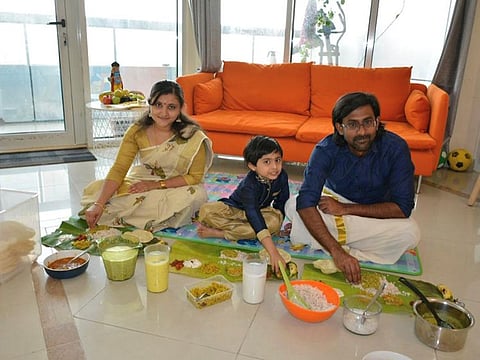'Sadhya' dining at restaurants, 'konna' flowers back in UAE as Keralites celebrate Vishu
Indian regional New Year celebrations remain low-key family affair for most amid COVID-19

Also In This Package
Dubai: Indian spring harvest festivals, most of which mark regional New Years in different states of the country, remained a low-key family affair for most expatriates in the UAE for the second consecutive year amid the COVID-19 pandemic.
While Kannadigas, Telugus, Maharashtrians, Kashmiris and Sikhs observed Ugadi, Gudi Padwa, Navreh and Baisakhi on Tuesday, Malayalees, Tamilians, Odias and Assamese rang in Puthandu, Vishu, Pana Sankranti and Bohag Bihu on Wednesday. Bengalis will be observing Poila Baisakh on Thursday.
Most of the Indian regional New Year celebrations saw subtle festivities in the UAE with families observing the customary celebrations at home and avoiding large gatherings.
The Guru Nanak Darbar Gurudwara, which used to be thronged by tens of thousands of mostly Sikh devotees for Baisakhi, only had a few hundreds of them visiting the Sikh temple on Tuesday due to the COVID-19 safety protocols in place.
“We just had a half-an-hour walk-in darshan in the morning and evening. Most people kept special prayers at home,” said Surender Singh Kandhari, chairman of the Gurudwara.
However, Keralites, who form the largest group of the 3.4 million-strong Indians here, found the return of sadhya (traditional vegetarian feast) dining at restaurants and konna flowers (Cassia fistula, commonly known as golden shower) for Vishu celebration after missing them last year during the stay-home period over COVID-19 restrictions.
What is konna?
Konna flower is an integral part of the Vishukkani, a spread of the harvested fruit and vegetables and everything auspicious that Hindu families from Kerala see first thing on Vishu morning.
Due to flight suspensions, konna, which is imported in tonnes only for Vishu, was missing from the Vishukkani prepared in most expats’ homes last year.
Sankar Anand, manager of Perumal Flower Stores, said the company managed to import around two tonnes of konna flowers for Vishu this time around. “Before COVID, we used to get almost double that quantity. Last year, we couldn’t bring konna flowers for Vishu. The supply was still less this time and the rates have gone up. It used to be sold for Dh35 to Dh40 per kg. But, this time it is about Dh55 to Dh60 per kg. Anyhow, most people just buy a few bunches of konna for Dh5 to Dh10 for Vishukkani.”
V. Nandakumar, director of Marketing and Communications at Lulu Group, said the Indian hypermarket chain also shipped a few tonnes of konna flowers for this Vishu. “As usual, we had also brought in fresh vegetables, fruit and banana leaves for kani and for making sadhya. We also sold sadhya for takeaway and had special discounts for ethnic outfits.”
Elaborate feast
Sunil Deth of Aaraamam Restaurant in Karama said several Malayalees, who could not make the elaborate vegetarian feast at home, were happy about Dubai restaurants serving sadhya again after a pause last year.
“There was no dining allowed during this time last year due to COVID-19 regulations. People had to take away sadhya from us. This time also we are encouraging customers to do takeaways or get them delivered, though dine-in is allowed with all safety precautions in place.”
He said his staff had to start preparations for the elaborate vegetarian feast from Monday itself. "We are really thankful to the government for allowing restaurants to serve food during fasting hours in Ramadan without any special permit. Even screening off the dining area has been made optional to ease the financial burden on eateries during the pandemic. We are also giving back to the community through the UAE Food Bank. Today, we delivered 600 sadhya kits to workers at a company in Jebel Ali through the Food Bank."
On Wednesday, one of his customers, Lakshmi Pillai, an administrative assistant in Dubai, said she had to settle for a mini-sadhya prepared at her accommodation last year. “We were working from home during Vishu last year. So, we prepared a small sadhya. Since dine-in is allowed this time, we colleagues came out early to have sadhya before the lunch rush began. It was really sumptuous and yummy,” said Lakshmi who also kept a kani at home.
Keeping traditions alive
The family of Gopikrishna Pillai, a project manager in Dubai, was among those who prepared sadhya at home. “We are very particular about keeping the traditions alive. We always keep Kani and make sadhya at home. This time also we did so. We had sadhya together when our son got back home after school. We want him to learn our traditions and remain connected to our roots,” he said.
Rejil Janardhanan, who works with the estimation department of a construction company in Abu Dhabi, said the cook at his ‘bachelors’ accommodation’ prepared sadhya for him and his friends.
“I used to bring my wife and children over here to celebrate Vishu every year before the pandemic as it is school vacation time for my kids. I haven’t been able to do that because of COVID since last year.”
He said having Vishu sadhya delivered from restaurants was a custom in his office. “We used to buy sadhya for all Indian and non-Indian colleagues and we used to eat together in office. But this time, we didn’t do it because there are many who are fasting during Ramadan. At our accommodation, friends who are fasting will be having the sadhya only at night.”
Sign up for the Daily Briefing
Get the latest news and updates straight to your inbox








